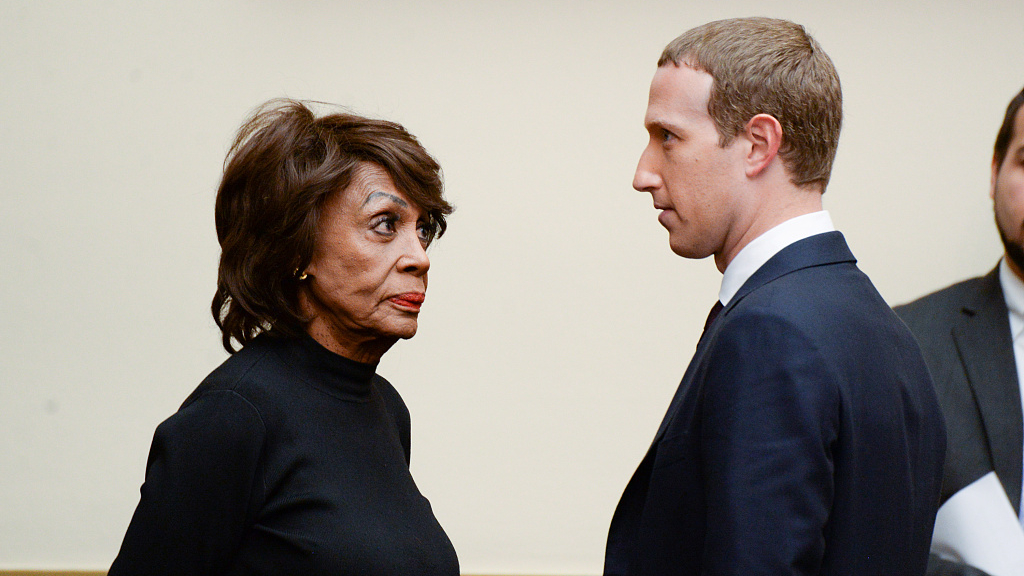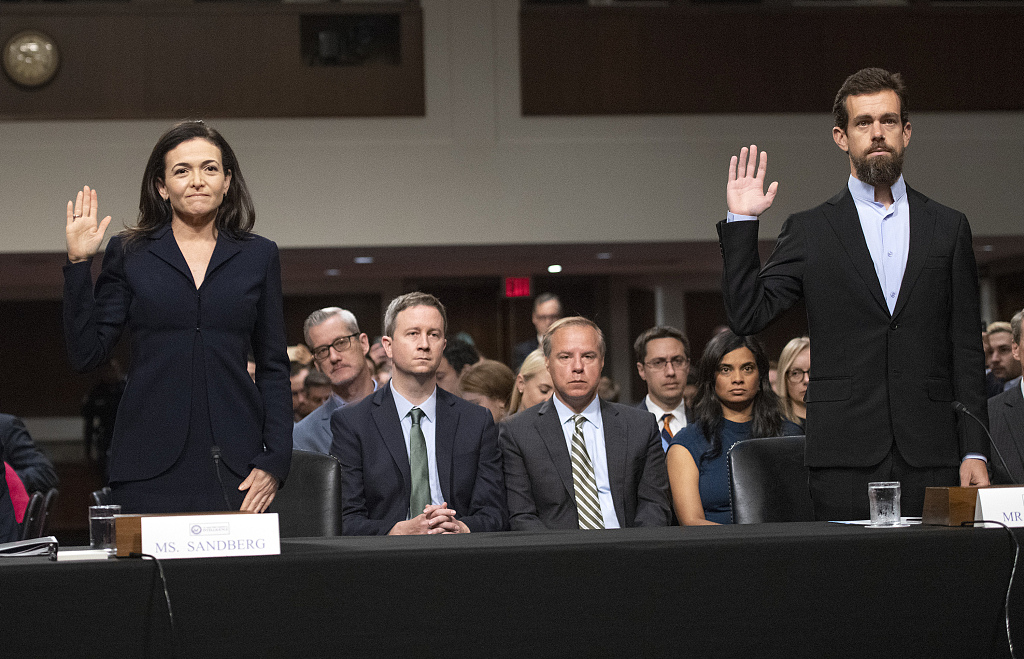
Congresswoman Maxine Waters (R), chair of the House Financial Services Committee, speaks with Facebook Chairman and CEO Mark Zuckerberg after a House Financial Services Committee hearing in Washington D.C., October 23, 2019. /VCG Photo
Congresswoman Maxine Waters (R), chair of the House Financial Services Committee, speaks with Facebook Chairman and CEO Mark Zuckerberg after a House Financial Services Committee hearing in Washington D.C., October 23, 2019. /VCG Photo
Editor's note: Kaushik Basu, former chief economist of the World Bank and former chief economic adviser to the government of India, is a professor of economics at Cornell University and nonresident senior fellow at the Brookings Institution. The article reflects the author's opinions, and not necessarily the views of CGTN.
The internet was once hailed as a powerful democratizing force – enabling innovative start-ups to compete with established businesses, disrupt entire industries, and create new ones. But as some of those startups grew into behemoths, they turned this force on its head. Far from leveling the playing field, Big Tech now largely owns it, and rather than democratizing the economy, the internet has ended up exacerbating the world's inequality problem.
Big Tech's rise has made a few people extremely wealthy. The richest among them, Amazon owner Jeff Bezos, lost 7 billion dollars – more than the total wealth of several countries, including Burundi and Sierra Leone (3 billion dollars each) – in a single day last week. And yet the biggest risk he faces as a result is falling to second place in the global wealth ranking, after another tech founder, Bill Gates.
Meanwhile, some 736 million people still lived in extreme poverty (less than 1.90 dollars per day) in 2015, and billions more lived on less than 2.50 dollars per day. Many workers worldwide – including low-level employees at tech companies like Amazon and freelancers who use platforms like Uber to find customers – face poor and deteriorating working conditions and stagnant wages. As labor's share of income declines, capital's share increases – trends that benefit the wealthy above all.
Given the power of major tech companies to stifle competition, reversing these trends will require government intervention. And, indeed, taming Big Tech has become a major issue ahead of the 2020 presidential election in the United States. In particular, Senators Bernie Sanders and Elizabeth Warren – in my view, the two strongest candidates vying for the Democratic Party's nomination to challenge President Donald Trump – have called for breaking up major tech companies.
But the solutions being proposed, including by legal scholars like Lina Khan, tend to focus on making better use of antitrust laws. This approach is unlikely to work, because markets have changed dramatically since antitrust laws were conceived.

Big tech has come under heavy scrutiny since the 2016 presidential election in the U.S. The picture shows Sheryl Sandberg, Chief Operating Officer of Facebook (L) and Jack Dorsey Co-Founder and Chief Executive Officer of Twitter (R) are sworn-in to give testimony before U.S. Senate on September 5, 2018. /VCG Photo
Big tech has come under heavy scrutiny since the 2016 presidential election in the U.S. The picture shows Sheryl Sandberg, Chief Operating Officer of Facebook (L) and Jack Dorsey Co-Founder and Chief Executive Officer of Twitter (R) are sworn-in to give testimony before U.S. Senate on September 5, 2018. /VCG Photo
In the late nineteenth century, Leon Walras produced the first models of how competitive markets work, showing how buyers and sellers decide, based on prices, how much to buy and sell. Walras visualized an auctioneer responsible for bringing buyers and sellers together and adjusting prices until market equilibrium – when aggregate demand for each good equals aggregate supply – is achieved. Subsequent work, such as that by Kenneth Arrow and Gerard Debreu, expanded upon the Walrasian model, but the auctioneer remained in the background.
With the emergence of digital platforms like Alibaba, Amazon, and Uber, however, everything changed. These platforms perform the work of Walras's imaginary auctioneer, only they are real – and profit-driven. They may even be willing to make large initial losses – as Amazon did for its first seven years in operation, when it accumulated some 2 billion dollars in debt – in order to maximize later gains. They know that they need only reach the point where they can reap the benefits of economies of scale, bringing enough buyers and sellers to the "auction" to make search, information, and transaction costs plummet.
In this sense, digital platforms are natural monopolies. Applying antitrust laws to break them up would thus eliminate their most fundamental advantage and destroy their ability to deliver benefits to economies and consumers.
This dilemma is not altogether new. Some central banks, such as the Reserve Bank of India, were once private organizations. But giving a single private agent power over something as consequential as money creation was quickly determined to be too risky. And dividing the responsibility among several authorities would make it impossible for any to serve a transaction-smoothing function, resulting in a costly fragmentation of the monetary system.
It is worth noting one other potential barrier to using antitrust laws to break up Big Tech. In the U.S., at least, such laws have focused primarily on protecting consumers. Recognizing that, many digital platforms have avoided hurting consumers, instead gouging the sellers who use their services to connect to buyers. But there is growing research – such as that conducted by Suresh Naidu, Eric Posner, and Glen Weyl – indicating that antitrust law should also be applied to protecting workers.
Still, given the ways digital platforms have transformed markets, governments must think beyond antitrust. One approach worth considering focuses not on breaking up tech giants, but rather on ensuring that their profits are more widely shared. This could be achieved, say, with regulations that require platforms over a certain size to disperse shares to a large number of individuals and also to funds dedicated to providing domestic and global public goods.
For the most influential platforms, governments may consider pushing a gradual shift to non-profit models, akin to public utilities. To be sure, this approach should be used sparingly, to avoid excessive and burdensome state intervention in the economy. But it is not in society's interest to have a single organization that is integral to the functioning of the entire economy – whether a central bank or digital platform – run by a small coterie of individuals for their own gain.
The precise contours of a strategy for constraining Big Tech will emerge – and evolve – over time. But I am hopeful that either Sanders or Warren – two politicians who seem to have the right "moral intention" – would be able to lead that process in a way that serves the interests of consumers, workers, and business owners alike.
Copyright: Project Syndicate, 2019.
(If you want to contribute and have specific expertise, please contact us at opinions@cgtn.com.)